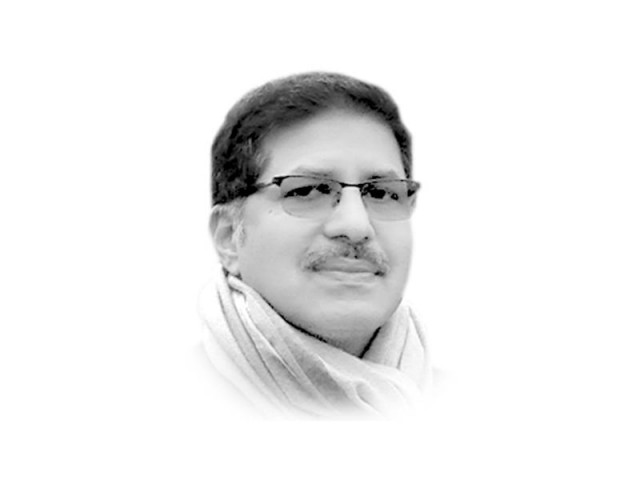Policing the press
Rules for media’s behaviour, whether by Supreme Court or government, would amount to ‘prior restraint’ & ‘censorship’.

Obviously, there has to be a balanced regulation by law on the one hand, and on the other, control of journalists through an enforceable code of behaviour by an outsider, be it the government or courts. While regulation is necessary, control amounts to censorship.
Of foremost importance are the fundamental rights of freedom of speech and information guaranteed under Pakistan’s Constitution against which even parliament cannot make any law. These freedoms are an integral part of the Universal Declaration of Human Rights (UDHR) and the International Covenants on Civil and Political Rights, which provide that “Everyone has the right to hold and express an opinion without interference and to seek, receive and impart information and ideas through any media and regardless of frontiers.”
In exercise of this right, the media is entitled not only to scrutinise acts of presidents and prime ministers, but also to debate judges’ conduct and judgments, which are matters of public importance. If any person errs (judges are human, too, and can make mistakes), people have the right to know and the media has an obligation to inform. This healthy exercise is necessary to enable any institution, including courts, to learn and rectify mistakes. In the words of a distinguished English judge, Lord Atkins: “Justice is not a cloistered virtue; she must be allowed to suffer the scrutiny and outspoken comments of men”. This concept, defining the role of courts and media, is an integral part of Pakistan’s law courtesy of a full bench Supreme Court judgment delivered in the case of famous columnist Ardeshir Cowasjee. Any judicial control of the media would distort this balance.
This does not mean that there should be no code for journalist ethics at all. Pakistan’s media is not a sacred cow and has its black sheep. Channels and newspapers are in business with profit-making motives and some may sometimes tailor news to suit certain interests or sensationalise it. In a race to give breaking news, anchorpersons and reporters have been known to publish stories defamatory of innocent people and without proper investigation. To achieve ratings, gory pictures of mutilated bodies have been shown. Media has been blamed for showing a negative image of Pakistan, which has led to investors being scared off from the country.
This is why Pakistan’s Constitution and the UDHR recognise that freedom of expression is not absolute but comes with duties and responsibilities, and that the media needs to be regulated with the imposition of reasonable restrictions (such as in the interest of Islam, Pakistan’s security and decency). However, in order to ensure that regulation does not kill freedom, a strict four-part test has been laid: restrictions must be 1) through law made by parliament; 2) clearly spelt out; 3) necessary; and 4) serve a legitimate purpose. The public should also be protected against misuse of media power through adequate laws against defamation. Pakistan’s laws (PEMAA, PCP and Defamation Ordinances) adequately impose reasonable restrictions and protect the public; there is no need for a further compulsory code. Any guidelines, like the doctors’ Hippocratic Oath, must be voluntary ones, otherwise, it will negate journalistic independence.
Rules for media’s behaviour, whether made by the Supreme Court or the government, would amount to ‘prior restraint’ and ‘censorship’. William Blackstone in his commentaries on laws of England considered that “Liberty of press is indeed essential to the nature of a free state: this consists in laying no previous restraints upon publications … Every free man has the undoubted right to lay what sentiment he pleases before the public; to forbid this, is to destroy the freedom of press”. The attempt to make a binding code was rejected by the US Supreme Court as it contravened the First Amendment of the US Constitution. The US-based Society of Professional Journalists (SPJ), in which this debate was concluded after months of study, too, believed that since “professional integrity is the cornerstone of a journalist’s credibility”, a code of ethics should be “embraced by all journalists”, but insists that such a code should be taken “voluntarily” and that “the code is intended not as a set of rules but as a resource for ethical decision-making … it is not — nor it can be under the First Amendment — legally enforceable.”
The Supreme Court’s attempt to formulate a compulsory code is against this established principle. Devising a code amounts to making a law for which, with respect, the Court has no jurisdiction. Not only would this be against fundamental rights but once the Court has formulated such rules, they would be free from judicial review, as the highest Court in Pakistan would be the author and also their final interpreter for the future. Even otherwise, the Supreme Court has no expertise on deciding how journalists should exercise their profession. Judges do not understand the “nuisances that involve journalistic crafts”. This is like saying that the media should decide the judges’ code or doctors should determine lawyers’ regulations.
What needs to be done and accomplished urgently is that all stakeholders in the media should suo motu draft an elaborate code on similar lines as the SPJ, enshrining at least the five basic principles that journalists should 1) be “honest, fair and courageous in gathering, reporting and interpreting information”; 2) treat everyone as “human beings deserving of respect”; 3) act “independently”; 4) be “accountable”; and 5) in the context of Pakistan, not “play the political actor”. Self-regulation would mean that media organisations should release financial reports voluntarily on the internet, have regular forums to hear and redress consumer complaints and proactively set up training and educational colleges to train professionals. This will avoid the necessity of any other institution policing the press.
Published in The Express Tribune, September 7th, 2012.
















COMMENTS
Comments are moderated and generally will be posted if they are on-topic and not abusive.
For more information, please see our Comments FAQ